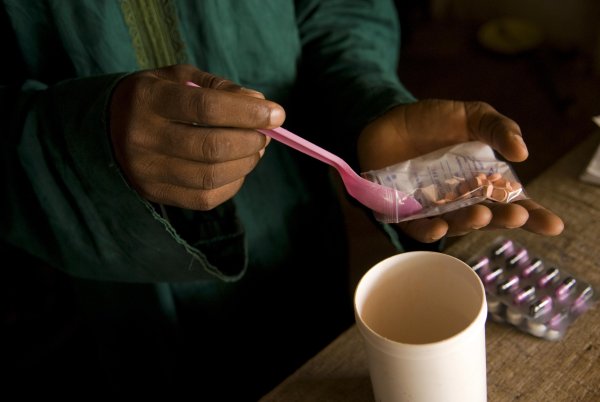One day meeting on antimalarial drug quality publishes discussion
The ACT Consortium drug quality programme shares findings from their multi-country study that assessed the quality of over 10,000 artemisinin-based combinations, purchased in six malaria endemic countries.

Falsified and substandard versions of commonly used antimalarials are frequently found in regions where malaria is endemic. The consequences include prolonged sickness, treatment failure, side effects, loss of income, increased healthcare costs and death. These medicines may contain sub-therapeutic amounts of artemisinin derivatives, such as artesunate. These sub-therapeutic antimalarials are one of the many causes for the emergence and spread of antimalarial drug resistance.
A report published this week in Malaria Journal presents the key findings and discussion points from a one day meeting held in May 2015 – ‘Fake antimalarials: Start with the facts’. The meeting’s key aim was to disseminate key information from the ACT Consortium’s research into the prevalence of false or substandard antimalarials in six countries endemic of malaria to a wide range of researchers and policy makers working in the field. WWARN's Director, Prof Philippe Guérin, attended the meeting along with many other representatives from other organisations
This report gives brief summaries of the talks presented at the meeting. These covered a variety of topics including: sampling strategies, surveillance strategies, techniques for drug quality analysis and strengthening health care systems, and the limited knowledge base for degraded drugs.
In a discussion about the linkage between substandard antimalarial treatment and the emergence and spread of antimalarial drug resistance, Prof Philippe Guérin, WWARN Director, stated: "Has everything been done to prevent or delay the evolution of drug resistance? Preventing the global spread is not an on-off button, it’s a complex mechanism. It requires us to recognise the science behind drug resistance, which must be translated into public health action. It can be achieved by improving the value of existing data, preserving efficacy of drugs in current use, detecting and managing resistance spread/emergence and ensuring efficacy of new drugs."
The WWARN Medicine Quality Group works to increase understanding of the prevalence and distribution of poor quality medicines around the world. The Antimalarial Quality Surveyor is an interactive visualisation tool, developed by the Medicine Quality Group, that displays published reports of antimalarial medicine quality across location and over time. The tool provides researchers and policy makers with a visualisation of the prevalence of antimalarial drug resistance to help respond to some of the critical gaps in information.
WWARN continues to work closely with organisations such as the ACT Consortium, The Global Fund to Fight Aids, Tuberculosis and Malaria and United States Pharmacopeial Convention, and other organisations to tackle the major threat of the development and distribution of falsified and substandard antimalarial treatments.
Publication details:
Kaur H, et at. Fake anti-malarials: start with the facts. Malaria Journal 2016.15:86 DOI: 10.1186/s12936-016-1096-x
